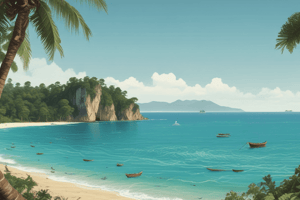Podcast
Questions and Answers
What percentage of the population in Andaman and Nicobar Islands lived below the poverty line in 2011-12?
What percentage of the population in Andaman and Nicobar Islands lived below the poverty line in 2011-12?
- 16.4%
- 10.4%
- 12.4%
- 14.4% (correct)
What is the main contributor to the economy of Andaman and Nicobar Islands?
What is the main contributor to the economy of Andaman and Nicobar Islands?
- Tourism (correct)
- Small-scale industries
- Agriculture
- Fisheries
What is the average annual GDP growth rate of Andaman and Nicobar Islands from 2012-13 to 2018-19?
What is the average annual GDP growth rate of Andaman and Nicobar Islands from 2012-13 to 2018-19?
- 8.4%
- 6.4%
- 7.4% (correct)
- 9.4%
What percentage of the GDP of Andaman and Nicobar Islands comes from the primary sector?
What percentage of the GDP of Andaman and Nicobar Islands comes from the primary sector?
What is the Human Development Index (HDI) value for Andaman and Nicobar Islands as of 2018?
What is the Human Development Index (HDI) value for Andaman and Nicobar Islands as of 2018?
What is the life expectancy at birth in Andaman and Nicobar Islands as of 2018?
What is the life expectancy at birth in Andaman and Nicobar Islands as of 2018?
What is the expected years of schooling in Andaman and Nicobar Islands as of 2018?
What is the expected years of schooling in Andaman and Nicobar Islands as of 2018?
What percentage of the GDP of Andaman and Nicobar Islands comes from the tertiary sector?
What percentage of the GDP of Andaman and Nicobar Islands comes from the tertiary sector?
Flashcards are hidden until you start studying
Study Notes
Economy of Andaman and Nicobar Islands
Economic Infrastructure
- The Andaman and Nicobar Islands have a limited economic infrastructure, with a focus on:
- Agriculture: With a large area under forest cover, agriculture is mainly limited to paddy, coconut, and spices.
- Tourism: The islands' natural beauty and rich biodiversity make tourism a significant contributor to the economy.
- Fisheries: With a long coastline, fisheries play a crucial role in the economy.
- Small-scale industries: Handicrafts, coir, and shell crafts are some of the small-scale industries present in the islands.
Poverty Rate
- As of 2011-12, the poverty rate in Andaman and Nicobar Islands was:
- 14.4% of the population living below the poverty line (BPL)
- The poverty ratio is higher in rural areas (15.6%) compared to urban areas (11.4%)
Human Development Index (HDI)
- As of 2018, the HDI value for Andaman and Nicobar Islands was:
- 0.714, ranking 11th among 36 states and union territories in India
- Life expectancy at birth: 72.4 years
- Expected years of schooling: 11.4 years
- Gross national income (GNI) per capita: ₹134,885
Sectorial Contribution to GDP
- As of 2018-19, the sectorial contribution to the GDP of Andaman and Nicobar Islands was:
- Primary sector (agriculture, forestry, and fishing): 24.1%
- Secondary sector (industry): 23.5%
- Tertiary sector (services): 52.4%
GDP Growth Rate
- The average annual GDP growth rate of Andaman and Nicobar Islands from 2012-13 to 2018-19 was:
- 7.4%
- The growth rate has been steadily increasing, with a high growth rate of 10.3% in 2016-17
Economy of Andaman and Nicobar Islands
Economic Infrastructure
- Agriculture is limited, with a focus on paddy, coconut, and spices due to the large area under forest cover.
- Tourism is a significant contributor to the economy due to the islands' natural beauty and rich biodiversity.
- Fisheries play a crucial role in the economy due to the long coastline.
- Small-scale industries, such as handicrafts, coir, and shell crafts, are present in the islands.
Poverty Rate
- The poverty rate in Andaman and Nicobar Islands was 14.4% as of 2011-12.
- The poverty ratio is higher in rural areas (15.6%) compared to urban areas (11.4%).
Human Development Index (HDI)
- The HDI value for Andaman and Nicobar Islands was 0.714 as of 2018, ranking 11th among 36 states and union territories in India.
- Life expectancy at birth is 72.4 years.
- Expected years of schooling are 11.4 years.
- Gross national income (GNI) per capita is ₹134,885.
Sectorial Contribution to GDP
- As of 2018-19, the sectorial contribution to the GDP was:
- Primary sector (agriculture, forestry, and fishing): 24.1%.
- Secondary sector (industry): 23.5%.
- Tertiary sector (services): 52.4%.
GDP Growth Rate
- The average annual GDP growth rate from 2012-13 to 2018-19 was 7.4%.
- The growth rate has been steadily increasing, with a high growth rate of 10.3% in 2016-17.
Studying That Suits You
Use AI to generate personalized quizzes and flashcards to suit your learning preferences.




